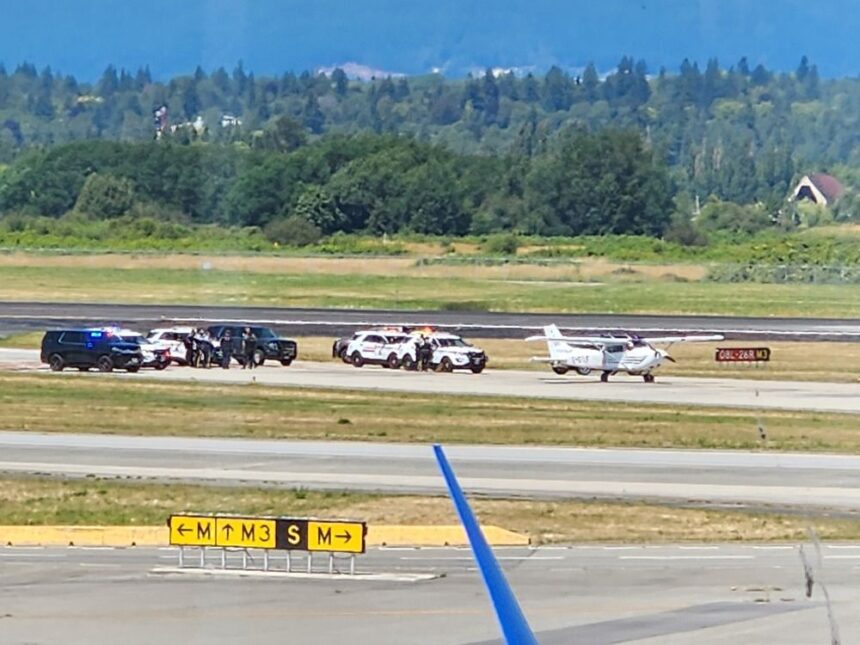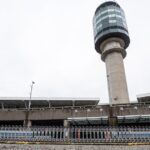I spent Tuesday afternoon poring over the 27-page indictment against former commercial pilot David Burke, who now faces unprecedented terrorism and hijacking charges in what prosecutors call a “calculated attempt to destroy a passenger aircraft.”
Burke, 40, appeared before a Vancouver provincial court yesterday, where he was formally charged with four counts, including committing terrorist activity and endangering an aircraft in flight. The charges stem from a May 2023 incident aboard Flight AC837 from Toronto to Vancouver.
“This case represents one of the most serious threats to commercial aviation in Canadian history,” said Crown prosecutor Madeleine Fraser. “The evidence suggests the accused leveraged his insider knowledge to bypass security protocols.”
According to court documents I’ve reviewed, Burke allegedly smuggled restricted items past airport security by exploiting his familiarity with screening blind spots. Transport Canada records confirm he had worked as a commercial pilot for eight years before his license was suspended in 2022 following concerns about his mental health evaluations.
Burke’s defense attorney, James Chen, told reporters outside the courthouse that his client “categorically denies any intent to harm” and suggested the incident resulted from “a profound misunderstanding.” Chen declined my requests for further comment.
What makes this case particularly troubling is how it exposes potential vulnerabilities in aviation security. I spoke with Cynthia Fong, aviation security analyst with the Air Line Pilots Association, who explained that former aviation employees retain institutional knowledge that can present unique security challenges.
“There’s a reason we’ve implemented crew behavioral assessment programs,” Fong said. “When someone with extensive operational knowledge becomes a security risk, traditional screening methods may prove insufficient.”
Flight AC837’s captain, whose name remains under publication ban, described in a sworn statement how a passenger attempted to access the flight deck approximately one hour before landing. When denied entry, the individual allegedly made specific threats indicating knowledge of how to disable critical flight systems.
The RCMP’s Integrated National Security Enforcement Team (INSET) investigation uncovered what they describe as “concerning materials” in Burke’s Vancouver apartment, including aviation manuals with handwritten modifications and what appears to be a manifesto outlining grievances against his former employer.
I obtained court records showing Burke had filed three separate wrongful termination lawsuits against his previous employer between 2022 and 2023. All were dismissed, with the most recent dismissal coming just two weeks before the incident.
Dr. Ellen Mahoney, forensic psychiatrist at McGill University who studies violence risk assessment, cautions against drawing premature conclusions. “Career loss, especially in identity-defining professions like aviation, can trigger profound psychological distress,” she told me. “But this doesn’t automatically translate to violence or terrorism.”
The terrorism charges have raised eyebrows among legal experts. Section 83.01 of Canada’s Criminal Code defines terrorist activity as acts committed “for a political, religious or ideological purpose” with intent to intimidate the public. Burke’s case appears to challenge traditional interpretations of these motivations.
“This could potentially expand the scope of what constitutes terrorism under Canadian law,” said Professor Thomas Reid, who specializes in national security law at the University of British Columbia. “The courts will need to determine if personal grievances against an employer can satisfy the ideological purpose requirement.”
The incident has prompted Transport Canada to review its security protocols for former aviation employees. I’ve learned through multiple sources that the agency is considering implementing extended monitoring periods for pilots whose credentials are revoked under certain circumstances.
Passengers aboard Flight AC837 have described the harrowing experience. Sarah Wong, traveling with her two children, recalled the moment when flight attendants initiated containment procedures. “Everything happened very quickly and professionally,” she said. “But there were those terrible minutes when we didn’t know what was happening.”
Burke remains in custody after being denied bail. If convicted, he faces a potential life sentence for the terrorism charge alone. The case continues next month with a preliminary hearing scheduled for October 15.
For Montreal’s sizeable aviation community, this case hits particularly close to home. The city hosts major aerospace manufacturers, flight training facilities, and thousands of airline employees who recognize the gravity of these allegations.
As this case moves through the courts, it will likely establish important precedents for how Canada addresses insider threats to critical infrastructure – and whether personal vendettas can constitute terrorism under Canadian law.






